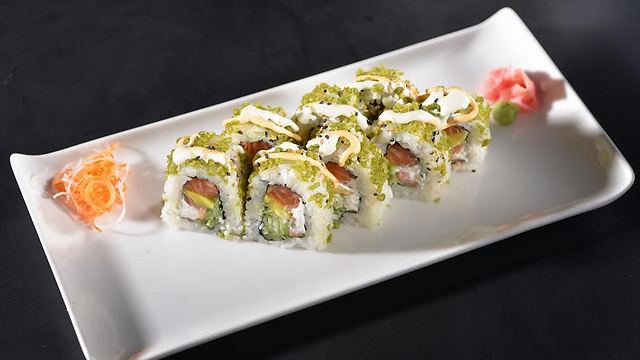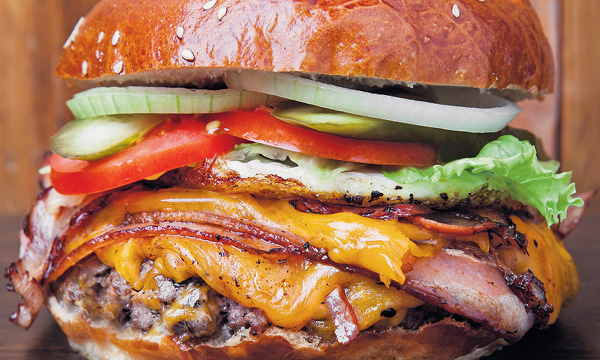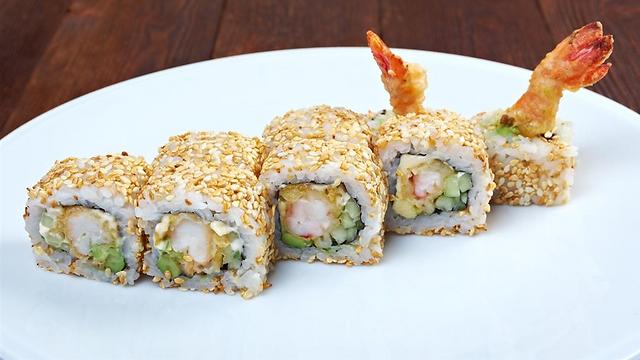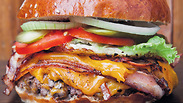
Who moved my bacon? Israeli restaurants' kosher trend
More and more restaurant chains as well as individuals businesses are choosing to take pork and sea food off the menu to cater to a more traditional diners. But these changes are also angering their loyal customer base, which loves bacon cheeseburgers and shrimp sushi.
When Israeli burger chain Agadair decided to remove bacon from its menu last summer, it caused quite a ruckus. After all, a bacon cheeseburger was considered the chain's signature dish.
The angry comments were quick to follow. Agadir, which at the time was also opening a kosher restaurant in Bnei Brak, was accused of capitulating to religious pressure. "You caved in to the Haredim, we won't come (to your restaurant) anymore," one irritated customer wrote on the chain's Facebook page. Another added: "You're trying to meet the religious public halfway, I'll try to meet you halfway by not coming anymore."
But Agadir was only the first. Next came sushi chain Japanika, which removed the sea food from its menu, and then hotdog purveyors Bayern Market that announced last week it will no longer sell pork sausages—one of the German food chain's most beloved dishes. Bayern also announced plans to open its first kosher food stand at Ben-Gurion Airport.
There is no doubt a new trend has emerged. A lot of restaurants and chains are going kosher: no pork, no shrimp and no calamari. The reasons are varied, but the trend is evident. Even Yoram Nitzan, the head chef at the Mul-Yam seafood restaurant, opened a kosher restaurant at the InterContinental David hotel. No more lobsters and oysters.Eitan Trabelus, the owner of Agadir, makes no effort to hide the fact that one of his considerations in giving up bacon was to make a statement of some sort to the religious public. "This step allowed us to cater to another target audience, the one bothered by the fact there is bacon in the restaurant's kitchen," he says. "At the same time, we're still not a kosher chain. We serve both cheese and meat, and we work on Shabbat. But there is a large traditional population in Israel that stays away from restaurants that serve pork, regardless of whether the place is kosher."
It's hard to ignore the fact you opened your first kosher restaurant in Bnei Brak at the same time as your announcement about removing bacon from all of your restaurants.
"It's true, but there's no connection between the two decisions. The idea to open a kosher restaurant in Bnei Brak came up two years ago, and the decision about the bacon came from entirely different reasons. Every once in a while, we examine our menu, and when we did that half a year ago, we noticed the burger with the bacon was selling less. Add to that the fact there was a shortage in bacon at the time, and because of that the price of bacon went up. Meaning, there was no request or religious coercion from anyone—these were two business decisions that it was the right time to make."
Many of your customers were very angry at this move.
"There will always be those who love making noise online, but financially things went on as normal. The work at the restaurants remained the same, and we're happy that we were given the option of catering to a religious and traditional target audience that we've not catered to before."
Any chance bacon would make a comeback?
"Not at the moment. I'm pleased with my decision, and financially this decision is good for the chain. But you never know. We operate based on the needs of the market, and if there is suddenly a nassive demand for bacon, we might make another change. What we did do is when we removed the bacon, we put in alternatives such as 'lamb bacon,' and most customers welcomed this with love.
"It's important to me to tell you this, because it's very moving for me to see seculars, traditionalists and religious people sitting side by side at our kosher restaurant and eating together. When I stand at the restaurant and look at our customers, in my heart I feel like I've united the people. It might sound condescending, but until recently I believed a kosher place was a place secular people must not enter, and certainly not a place that serves delicious food."
Fire Shrimpsy
Bayern's decision to remove the pork sausages from their Sarona Market food stand was seen as even more dramatic. The pork sausage is the cornerstone of every restaurant serving German food. At least on the outside, Dorian Copitt, the CEO of Bayern Market, doesn't appear to be too worried by the barrage of outrage surrounding the decision.
"When the chain was still in its infancy, all of our locations served pork sausages, and we simply saw there was no demand," he says. "The sausages were removed without much ado from four locations and were left on the menu only in one place, at Sarona Market. Now we've decided to stop selling them there as well, and we issued a statement to the media."
It looks to many customers like religionization.
"Far from it. We decided for financial reasons that for two dishes sold in only one location, it's not worth it for us to give up on a big audience of customers and have the entire chain seen as one that sells pork. And no, I'm not just talking about the ultra-Orthodox and religious populations, for whom we will probably open kosher locations in the future, I'm talking about the traditional audience and the secular people who do mix meat and dairy, but pork feels like too much of a deviation from the cultural norms they grew up with.
"We're not a kosher chain, and we don't pretend to be. We sell sausages with cheese, and the only change is removing two pork sausages from the menu."
Have you noticed a drop in sales because of the bad publicity?
"There were articles with quotes from people who said they won't come anymore, and that the chain lost them as customers, and all sorts of comments against the change—but in the field, the numbers are different. Since the pork was removed from the menu several weeks ago, the number of customers at the Sarona Market location has actually gone up.
"It's important to me to say that we didn't try to jump on the bandwagon, as you in the media like to call it. Just like McDonald's sells bacon all over the world, but in Israel it chose not to, we chose to stop selling pork, because we saw it wasn't as beneficial financially. What's all the fuss about?"
Unlike Bayern, Japanika removed the sea food from its menu quietly, without issuing a statement to the media. Perhaps it was because they were trying to avoid the kind of bad publicity Agadir experienced. But it didn't work. The news that shrimp had been removed from their menu caused quite an outrage.
To address the issue, Japanika released a video titled "Fire Shrimpsy" (which is actually rather funny), doing its own version of Labor leader Avi Gabbay's press conference announcing the split from Tzipi Livni's Hatnua, with Gabbay replaced by a giant sushi roll, while Livni is replaced by a weepy shrimp. The video helped minimize the bad publicity, but did not get Japanika completely off the hook.
"The reason for the change is very simple," says Japanika CEO Gadi Benoliel. "It all derives from financial reasons, and any other motive the media gives this is far from true."
So why the sudden change?
"It's very simple: The dishes that include sea food are not in demand in the chain's restaurants. In addition, the Health Ministry requires sea food to have its own section in the kitchen, and that is a waste of real estate that the restaurant needs for other things. To say we're capitulating to the religious public is far from the truth. We are open on Shabbat and sell meat and dairy together.
"It's important to me that people understand this change took two whole years, during which we thoroughly examined the issue and only then made the change. Believe me, food chains don't decide to remove raw materials or certain dishes from the menu if they are popular and profitable."
Benoliel admits, however, that the chain didn't plan on making a public statement on the matter. "I released a quiet message to the franchisees that we're going on a new journey without sea food. And then something bizarre happened—journalists framed our choice as political, a capitulation to the Haredim."
Is there a chance you will go back on your decision?
"At the moment, no. There's no demand for sea food. We have eight kosher restaurants across the country, and as for the non-kosher locations—with sea food and without it, we're not relevant for the Haredim. We have no kosher certification, and the kitchen doesn't separate dairy and meat."
In grandpa's memory
The kosher trend is not exclusive to the restaurant chains. A series of bars and restaurants across the country have recently gone kosher as well. Giggsi, a bar-restaurant in Be'er Sheva, decided three months ago to shut its doors on Shabbat and turn kosher.
"The population in Be'er Sheva is more traditional than the population in Tel Aviv, so we weren't selling sea food and pork anyway. But we weren't kosher because we were open on Shabbat," says owner Asaf Benatia.
Why did you suddenly decide to make the change?
"Both myself and my business partner come from traditional homes. When my grandfather passed away, the change just felt right to me. He was a man of faith and would not eat at my restaurant because I didn't have a kosher certificate. I felt he would be happy to see from above the change I made in his memory."
And the responses?
"There were some who reacted negatively, claiming they wouldn't come anymore or boycott the place, saying we capitulated to the religious. But at the same time, our sale numbers went up. You have to understand we gave up on the two most profitable days of the week in the restaurant business (Friday and Saturday), while at the same time we saw an increase in profits. If my restaurant was in Tel Aviv, I might have chosen differently."
The famous Al Hamayim (On the Water) restaurant in Herzliya also changed its menu a year ago and went kosher. Aviram Hason, the owner, says he became more religious, and so he chose to make his restaurant kosher, after 27 years in which it operated without a kashrut certificate.
"Our restaurants are very successful on weekends, and as an owner I took a significant step that could have financially hurt our bottom line. I was happy to see there's a broad audience of religious people who choose to come specifically to us from all across the country. In hindsight, I can say it was a financially beneficial choice," he says.
Parve mashed potatoes
Chef Shaul Ben-Aderet explains that choosing to go with a kosher menu is an inevitable financial move for many restaurateurs. "As you know, my restaurants are not kosher. They operate on Shabbat and serve sea food," he says.
"When I opened the Kimmel restaurant in Tel Aviv 25 years ago, I had dishes that included pork, but after a short while I realized pork specifically was causing aversion to many people. Meaning, sea food was welcomed by my customers, but pork was taboo. The public has to remember that restaurants and food companies are businesses that want to give customers what they want. At the Kimmel Gilboa restaurant, because of the more traditional population in the area, I decided not to sell sea food and separate dairy from meat. For example, a beef tenderloin dish, which is served with mashed potatoes—the mashed potatoes will be parve (neither meat nor milk), while in Tel Aviv they are dairy. I see this as being considerate toward my customers and understanding their needs."
So are you in favor of this trend?
"I think every business needs to operate according to what works for it and its customers. A number of restaurateurs I know have turned their restaurants kosher, and they are completely happy with the change. They claim they got new customers that hadn't come in the past, while at the same time they gained days off on Friday and Saturday. Furthermore, some even say their profits haven't changed, and at times even increased. I don't think turning a restaurant kosher is pandering, and it's not necessarily negative. Moreover, restaurants that want groups of people or companies to come to them should have a kosher option. It's enough that one person keeps kosher, and the entire group won't come to you, and that's a great loss."
What are the downsides to turning a restaurant kosher?
"If you ask my opinion, it appears that in the coming years more and more modern kosher restaurants are going to appear, with menus that try to appeal both to the religious audience and to the secular one.
"The limitations of a kosher restaurant are mostly in the costs: a kashrut supervisor; kosher raw materials that cost more; closing our doors at Passover and weekends, which are strong days in the restaurant business. When a restaurant is debating whether to become kosher, it needs to first look at the geographic area it is located in. In Tel Aviv, it's less important, but in Jerusalem and in the periphery, it's critical."
As an example, he mentions the kosher restaurant that chef Moshe Segev opened in Be'er Sheva several months ago, which he recently turned non-kosher due to financial considerations.
Segev explained his decision saying there is no financial justification in keeping a restaurant in Be'er Sheva closed on Saturday, as it is the most profitable day of the week. "The advantage of a kosher restaurant is obvious; it can appeal to all sectors of society," he says. "But you also need to think financially and see whether in that particular location, there is financial justification for that choice."
"In any case, even in my non-kosher restaurants, 99 percent of them won't serve sea food, and I've never served pork in my restaurants. In the one percent that did serve sea food, I chose to remove it from the menu several years ago."










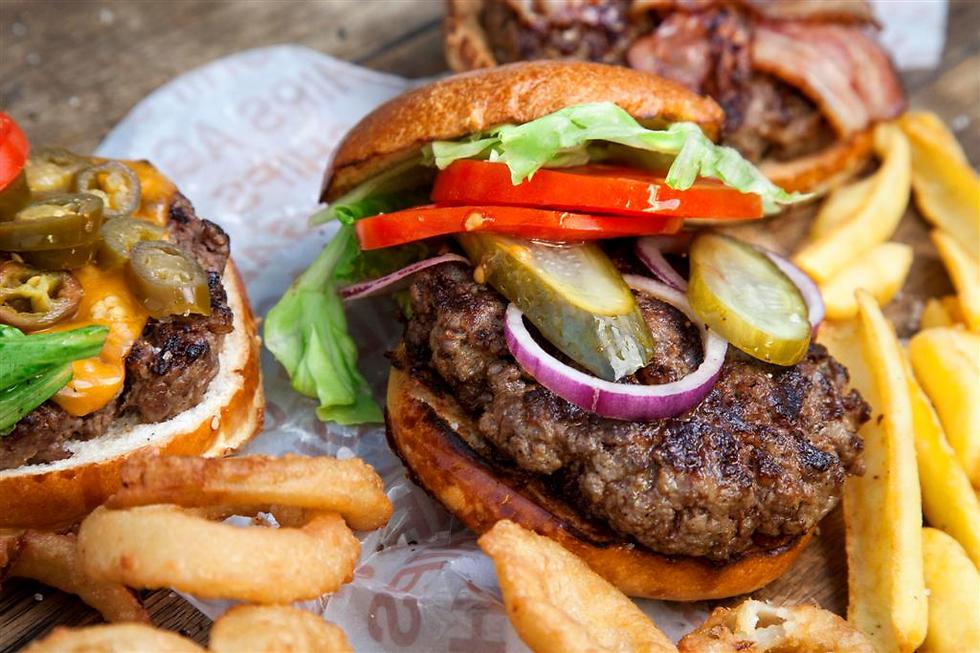
.jpg)
.jpg)
.jpg)
